完整7BU4七年级第二学期英语笔记
初中英语|人教版七年级下册Unit4英语课堂笔记

初中英语|⼈教版七年级下册Unit4英语课堂笔记⼈教版七年级下册Unit4英语课堂笔记⼀、重点短语arrive late for class上课迟到after breakfast早饭后after that 在那之后be quiet in the library在图书馆保持安静be strict with sb in sth 在某⽅⾯对某⼈严格bring music players to school把⾳乐播放器带到学校来do the dishes清洗餐具eat outside在外⾯吃feel/be terrible感到/是很糟糕的fight with sb 和某⼈打架follow the rules遵守规则go to bed before 10:00 10点之前睡觉have more rules有更多规则have to clean the classroom必须打扫教室展开全⽂have to wear a school uniform必须穿校服have too many rules有太多规章制度help his mom make breakfast帮他妈妈做早饭in the dining hall在餐厅in the music room在⾳乐室keep my hair short留短发know how you feel知道你的感受learn to play the piano学会弹钢琴make one's bed铺床make rules制定规章制度on school days 在上学⽇on school nights在上学晚上practice (playing) the guitar练习(弹)吉他read books/read a book读书run in the hallways在⾛廊上跑some of the rules其中⼀些规章制度⼆、重点句型1.—What are the rules at your school?在你们学校有什么规章制度?—We can't arrive late for class./We must be on time for class.我们上课不能迟到。
最新人教版新目标七下英语U4单词短语知识点精学笔记

七年级英语下册Unit4精学笔记学生姓名所在班级所在学队单元课时计划Unit4精学笔记要求1、仔细研读教材,根据教材,完成下列填空。
2、每一个填空都是一个知识点,要求把整个知识点划在课本上。
3、每一知识点,都要求互检互签,互检在知识点的右侧空白处签上检查人员的名字。
基础知识重点知识难点知识知识点1重点单词:1. 规则______ 2.到达______3.大厅_______4.学习_______5.听_______6.打架_______7.抱歉的_________8.在外面________ 9.穿,戴_________ 10.重要的_________11.带来__________ 12.安静的_______ 13.外出_________14.练习_________ 15.碟,盘_________ 16.以前_________17.脏的_________18.厨房________19.更多的________20.吵闹的__________21.放松__________22.阅读__________23.可怕的_______24.感受_______ 25.严格的__________26.记住,记起___________27.遵循,跟随__________ 28.运气_____________29.保持__________ 30.头发__________互检互签:____________ 知识点2重点短语:1.准时be ______ _______2.听listen ______3.在课堂上in _____4.做….迟到be ______ ______5.餐厅_______ _______6.安静be _______7.外出(娱乐)go ______ 8.清洗餐具do _______ ______9.做早饭make _____ 10.铺床_____ one’s bed 11.吵闹的______ noisy 12.留短发keep hair _____互检互签:____________ 13.和某人一起玩play ______ sb. 14.遵守规则follow ______ _______15.玩得高兴have _______ 16.制定规则_______ _________17. ______ +动词原形. 不要做某事18. _____ sb. (to) do sth. 帮助某人做某事19. too ______ +可数名词复数太多的20. learn ____ _____ 学会做某事21. have ______ ____ 不得不做某事22. be strict ____ sb._____ sth. 对某人某事要求严格互检签字:____________基础知识重点知识难点知识知识点3:祈使句的否定式祈使句(变否定在句首+don’t)1)Be型(be +表语),否定形式:______ + adj Be ____,please. Don’t ___ ___!2) Do型(实义动词+其他),否定形式:______ +_______+其他Come here,please. ________(not) play football here.3)Let型(let sb do sth),否定形式:_____+ let sb ____sth或者let sb __ ___ sth4)No+n/ V-ing ____ photos /mobile;_____parking/ smoking练习:1.Don't ____ late for school.A.is B.be C.arrives D.was2._________(not arrive) late for Lucy's birthday party.3.Don't _______ (eat) in your bed,Emily互检签字:____________知识点4:Must 与have to(1)must 表示说话人_______的看法,意为“_____”。
人教版英语 七年级下册 7单元知识点笔记
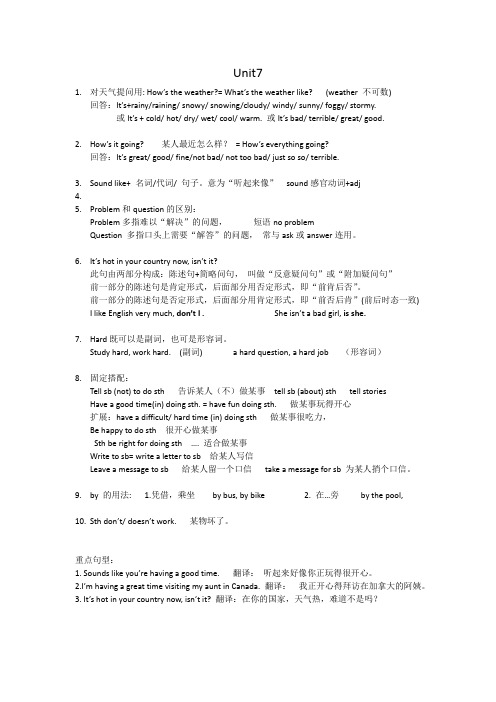
Unit71.对天气提问用: How’s the weather?= What’s the weather like? (weather 不可数)回答:It’s+rainy/raining/ snowy/ snowing/cloudy/ windy/ sunny/ foggy/ stormy.或It’s + cold/ hot/ dry/ wet/ cool/ warm. 或It’s bad/ terrible/ great/ good.2.How’s it going? 某人最近怎么样?= How’s everything going?回答:It’s great/ good/ fine/not bad/ not too bad/ just so so/ terrible.3.Sound like+ 名词/代词/ 句子。
意为“听起来像”sound感官动词+adj4.5.Problem和question的区别:Problem多指难以“解决”的问题,短语no problemQuestion 多指口头上需要“解答”的问题,常与ask或answer连用。
6.It’s hot in your country now, isn’t it?此句由两部分构成:陈述句+简略问句,叫做“反意疑问句”或“附加疑问句”前一部分的陈述句是肯定形式,后面部分用否定形式,即“前肯后否”。
前一部分的陈述句是否定形式,后面部分用肯定形式,即“前否后肯”(前后时态一致)I like English very much, don’t I . She isn’t a bad girl, is she.7.Hard既可以是副词,也可是形容词。
Study hard, work hard. (副词) a hard question, a hard job (形容词)8.固定搭配:Tell sb (not) to do sth 告诉某人(不)做某事tell sb (about) sth tell storiesHave a good time(in) doing sth. = have fun doing sth. 做某事玩得开心扩展:have a difficult/ hard time (in) doing sth 做某事很吃力,Be happy to do sth 很开心做某事Sth be right for doing sth …. 适合做某事Write to sb= write a letter to sb 给某人写信Leave a message to sb 给某人留一个口信take a message for sb 为某人捎个口信。
译林牛津七年级下册英语unit4知识点总结

7BU4 Finding the wayWelcome 语言点1. A is +方向of B (A在B的什么方位)上海在南京的东面Shanghai is of Nanjing. =Shanghai is to the east of Nanjing.A is in the +方向of B(A在B里面什么方位)上海在中国的东面Shanghai is of China. 台湾在中国的东南Taiwan is in the southeast of China.美国在加拿大的南面。
The US is (to the) south of Canada.公园在学校的西北面。
The park is (to the) northwest of the school.北京在中国的北部。
Beijing is in the north of China. =Beijing is in the northern part of China.北京在江苏的北面。
Beijing is (to the) north of Jiangsu.山东在江苏的北面。
Shandong is (to the)north of Jiangsu.香港在中国的南部,澳门在香港的西部。
(Hong Kong, Macau)2. Follow me, Eddie. =Come with me. (follow=come/go after)follow sb. to sp. 请跟我到图书馆。
Please follow me to the library.跟我来,我会告诉你路线。
Follow me and I’ll show you the way.冬去春来。
Spring follows winter. 沿着这条街走到公交车站。
Follow the street to the bus stop. 3. Are you sure, Hobo? be sure 确信,有把握(1) be sure to do sth. 表示说话人推测“一定,必然会”。
(完整版)人教版七年级下英语(unit4)知识点总结全
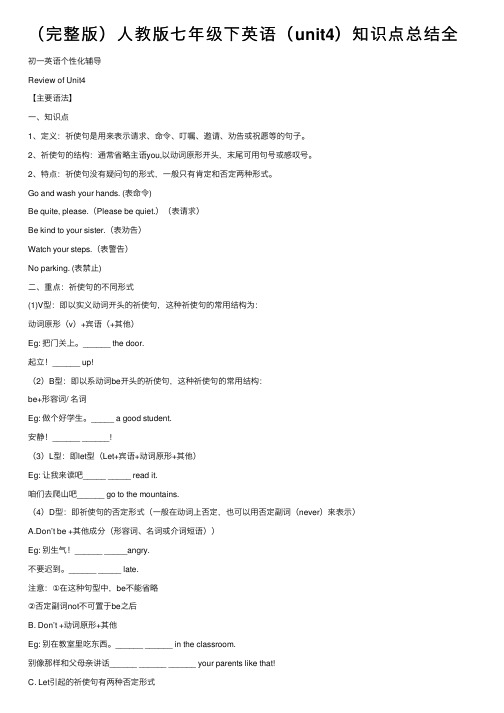
(完整版)⼈教版七年级下英语(unit4)知识点总结全初⼀英语个性化辅导Review of Unit4【主要语法】⼀、知识点1、定义:祈使句是⽤来表⽰请求、命令、叮嘱、邀请、劝告或祝愿等的句⼦。
2、祈使句的结构:通常省略主语you,以动词原形开头,末尾可⽤句号或感叹号。
2、特点:祈使句没有疑问句的形式,⼀般只有肯定和否定两种形式。
Go and wash your hands. (表命令)Be quite, please.(Please be quiet.)(表请求)Be kind to your sister.(表劝告)Watch your steps.(表警告)No parking. (表禁⽌)⼆、重点:祈使句的不同形式(1)V型:即以实义动词开头的祈使句,这种祈使句的常⽤结构为:动词原形(v)+宾语(+其他)Eg: 把门关上。
______ the door.起⽴!______ up!(2)B型:即以系动词be开头的祈使句,这种祈使句的常⽤结构:be+形容词/ 名词Eg: 做个好学⽣。
_____ a good student.安静!______ ______!(3)L型:即let型(Let+宾语+动词原形+其他)Eg: 让我来读吧_____ _____ read it.咱们去爬⼭吧______ go to the mountains.(4)D型:即祈使句的否定形式(⼀般在动词上否定,也可以⽤否定副词(never)来表⽰)A.Don’t be +其他成分(形容词、名词或介词短语))Eg: 别⽣⽓!______ _____angry.不要迟到。
______ _____ late.注意:①在这种句型中,be不能省略②否定副词not不可置于be之后B. Don’t +动词原形+其他Eg: 别在教室⾥吃东西。
______ ______ in the classroom.别像那样和⽗母亲讲话______ ______ ______ your parents like that!C. Let引起的祈使句有两种否定形式a. Let+宾语+not+动词原形+其他Let her not do that.Let’s not think about it. It’s only a waste of time.b. Don’t+ let+宾语+动词原形+其他Don’t let Jim do that.Don’t let us go, please.三、难点:1、特殊形式的祈使句(1)在公共场合的提⽰语中,否定祈使句常⽤“No+名词/ V-ing形式”结构,表⽰“禁⽌做某事”。
7BU7七年级第二学期英语笔记
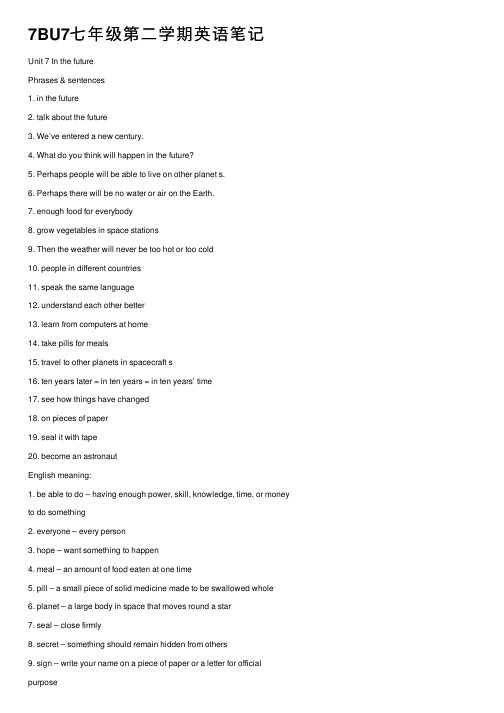
7BU7七年级第⼆学期英语笔记Unit 7 In the futurePhrases & sentences1. in the future2. talk about the future3. We’ve entered a new century.4. What do you think will happen in the future?5. Perhaps people will be able to live on other planet s.6. Perhaps there will be no water or air on the Earth.7. enough food for everybody8. grow vegetables in space stations9. Then the weather will never be too hot or too cold10. people in different countries11. speak the same language12. understand each other better13. learn from computers at home14. take pills for meals15. travel to other planets in spacecraft s16. ten years later = in ten years = in ten years’ time17. see how things have changed18. on pieces of paper19. seal it with tape20. become an astronautEnglish meaning:1. be able to do – having enough power, skill, knowledge, time, or money to do something2. everyone – every person3. hope – want something to happen4. meal – an amount of food eaten at one time5. pill – a small piece of solid medicine made to be swallowed whole6. planet – a large body in space that moves round a star7. seal – close firmly8. secret – something should remain hidden from others9. sign – write your name on a piece of paper or a letter for official purpose10. space – an empty areaTransformation1. enter v. --- entrance n.2. able adj. --- unable adj. * disabled adj.3. grow v. --- growth n.4. speak v. --- speech n. speaker n.*speaking adj. spoken adj.5. pollution n. --- pollute v.6. terrible adj. --- terribly adv.7. sign v. / n. --- signature n.8. change n. / v. --- changeable adj. --- changing adj. Grammar1. talk about speak the same languagetalk loudly talk to/ with sb. talk about sth.speak at the meeting speak to sb. speak Chinesetell a story tell the time tell sb. sth.tell sb. about sth. tell sb. (not) to do sth.say sth. say to sb. say the word in English2. enter spl. = go/ come/ walk into spl.3. What will happen next? happen = take placeWhat happened last night? What has happened?happen to do. happen to sb.e.g. I happened to meet a friend of my father’s.What has happened to you? You look upset.4. perhaps = possibly; probably; maybe5. be able to do = can dobe unable to do = can not docan also = be also able to(can / could ⽤于现在时和将来时,⽆其它时态变化) 6. other planets another planet*the other planet*the other planetse.g. Perhaps we will be able to travel to other planets.Perhaps we will be able to travel to another planet.7. There will be no water or air on the Earth.There won’t be any water or air on the Earth.no = not any / not a8. I think so. / I don’t think so.I hope so. / I don’t hope so.I agree. / I don’t agree. / I disagree.9. different countriesthe same language10. I hope that I will become an astronaut. =I hope to become an astronaut.。
人教版七下英语Unit4笔记资料

Unit 4 Don’t eat in class1.祈使句(变否定在句首+don’t),主语you常省去,否定中=You can’t do.. (记忆模型:NBPLV)N: No+n/ V-ing No photos /mobile;No parking/ smoking/ spitting/ talking/ pickingB: Be quiet,please. Don’t be late!P:please+动词原型L:Let型(let sb do sth),否定形式:let sb not do sthV:动词原型开头:实义动词+其他,否定形式:don’t +实义动词+其他Come here,please. Don’t play football here.2.in class在课堂上in the classroom 在教室After class课后be in bed 卧床on the bed 物体在床上be on time准时be in time 及时on school nights在学校的晚上at night在晚上on school days在上学日every school day每个上学日3. listen to music 听音乐(动作过程)hear:听到(表示结果)同:look at 看动作过程,后面带宾语,see 强调看的结果,watch:观看、注视,这3个都有看的意思,但搭配不同。
4.fight with sb.与某人打架发fight for sth.为…战斗Fight againt.反对5.rules:规则(名词);统治,管理(动词)school rules family rules break the rules:违反规则follow (obey)the rules:遵守规则6.get,reach与arrive区别三者均可表示“到达”的意思,区别如下:arrive 和get都是不及物动词,两者之后均不可接宾语,但可接here, there, home之类的表地点的副词作状语.如:We got 〔arrived〕here last night.我们昨晚到达这儿.Reach可直接接宾语,arrive at +小地点arrive in+大地点arrive late for class=be late for class 上课迟到7.eat outside 出去吃饭go outside/go out外出outside of 在...的外面8.Must 与have to 的区别。
最新人教版七年级下册英语Unit7精学笔记
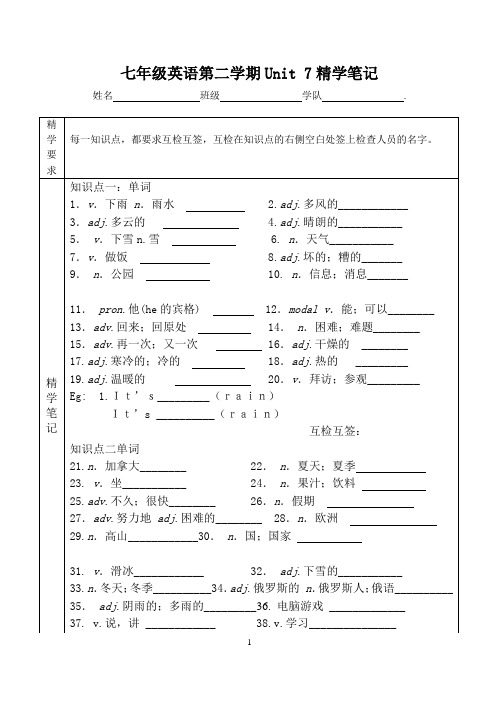
七年级英语第二学期Unit 7精学笔记姓名班级学队.精学要求每一知识点,都要求互检互签,互检在知识点的右侧空白处签上检查人员的名字。
精学笔记知识点一:单词1.v.下雨n.雨水 2.adj.多风的____________3.adj.多云的 4.adj.晴朗的___________5.v.下雪n.雪 6. n.天气___________7.v.做饭 8.adj.坏的;糟的_______9.n.公园 10. n.信息;消息_______11.pron.他(he的宾格) 12.modal v.能;可以________ 13.adv.回来;回原处 14.n.困难;难题________ 15.adv.再一次;又一次 16.adj.干燥的 ________ 17.adj.寒冷的;冷的 18.adj.热的 _________ 19.adj.温暖的 20.v.拜访;参观_________Eg: 1.It’s_________(rain)It’s __________(rain)互检互签:知识点二单词21.n.加拿大________ 22.n.夏天;夏季23. v.坐___________ 24.n.果汁;饮料25.adv.不久;很快________ 26.n.假期27.adv.努力地adj.困难的________ 28.n.欧洲29.n.高山____________30.n.国;国家31. v.滑冰____________ 32.adj.下雪的___________33.n.冬天;冬季__________34.adj.俄罗斯的n.俄罗斯人;俄语__________ 35.adj.阴雨的;多雨的_________36. 电脑游戏_____________37. v.说,讲 ____________ 38.v.学习_______________39. n.问题 ____________Eg:I want some_________(drink).互检互签:知识点三:短语1.不错________ 2.在公园________3.过得很愉快_______________=_________________=_________________. 4.为……捎个口信_______________ 5.给某人回电话_________________ 6.没问题__________________ 7.现在_____________8.在春天/夏天/秋天autumn/冬天___________/_____ /_____________/_________.9.其中的一些 _______________Eg翻译:我能为他捎个口信吗?May I _____ a _______ _____ him?互检互签:知识点四:短语10.在游泳池边____________________11.喝橙汁/茶_________________ 12.努力学习_______________________13.度假_____________________ 14.在山里______________________15. 给某人打电话________________ 16.给某人写信_____________________17.适合……____________________ 18.给……拍一张照片Eg:翻译:我正在给我妈妈写信。
(完整)7BU4七年级第二学期英语笔记
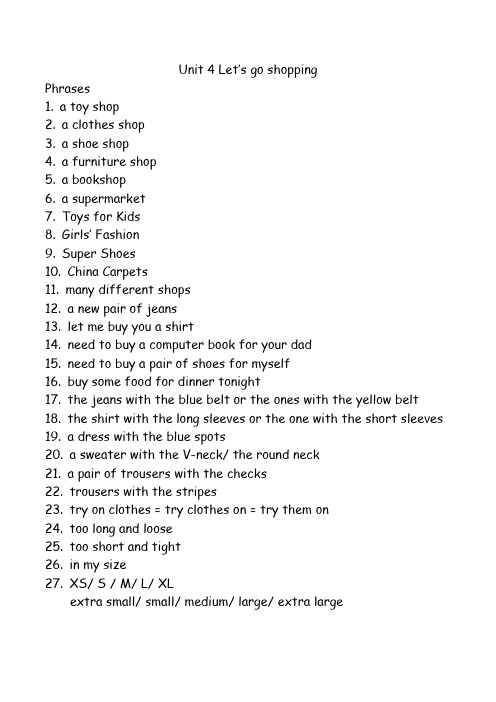
Unit 4 Let’s go shoppingPhrases1. a toy shop2. a clothes shop3. a shoe shop4. a furniture shop5. a bookshop6. a supermarket7. Toys for Kids8. Girls’ Fashion9. Super Shoes10. China Carpets11. many different shops12. a new pair of jeans13. let me buy you a shirt14. need to buy a computer book for your dad15. need to buy a pair of shoes for myself16. buy some food for dinner tonight17. the jeans with the blue belt or the ones with the yellow belt18. the shirt with the long sleeves or the one with the short sleeves19. a dress with the blue spots20. a sweater with the V-neck/ the round neck21. a pair of trousers with the checks22. trousers with the stripes23. try on clothes = try clothes on = try them on24. too long and loose25. too short and tight26. in my size27. XS/ S / M/ L/ XLextra small/ small/ medium/ large/ extra largeEnglish meaning:1. carpet --- a thick, heavy floor covering, usually made of wool2. certainly --- of course3. check --- a single one of the squares4. kid --- a child or young person5. medium --- of middle size6. neck --- the part of the body that connects the head with theshoulder7. spot --- a small part unlike the rest8. super --- wonderful9. tight --- fitting closely, close10. try on --- put on to test the size or looks11. tight ←→loose adj.Transformation1. I --- me --- my --- mine --- myself pron.2. clothes n. --- cloth n. --- clothing n.3. fashion n. --- fashionable adj.4. taste v. --- tasty adj.5. fun n. --- funny adj.6. kid n. --- kid(ding) v.7. spot n. --- spotted adj. --- spotless adj.8. certain adj. --- certainly adv.9. change v. / n. --- changeable adj.10. bake n. --- baker n. --- bakery n.Grammar1. need to do/ needs to do/ needed to do/ will need to doe.g. We need to buy something for dinner.Alice also needs to buy a new shirt for the performance.Tom needed your help yesterday, but you weren’t here.The students will need another plan for the coming weekend.2. something / anything/ nothing + 形容词e.g. I have something important to tell you.Have you got anything else to eat?Peter has nothing emergent to do now.3. buy sb. sth. = buy sth. for sb.draw sb. sth. = draw sth. for sb.make sb. sth. = make sth. for sb.cook sb. sth. = cook sth. for sb.搭配介词to 的词组:give sb. sth. = give sth. to sb.bring sb. sth. = bring sth. to sb.send sb. sth. = send sth. to sb.pass sb. sth. = pass sth. to sb.show sb. sth. = show sth. to sb.write sb. sth. = write sth. to sb.leave sb. sth. = leave sth. to sb.tell sb. (about) sth. = tell sth. to sb.4. a pair of trousers/ pants/ jeans/ socks/ shoes/ boots/ glasses; etc.e.g. A pair of jeans is enough when you go traveling.There are three pairs of trousers over there. You can try them on.The jeans over there are only for men.5. … with … (pattern)e.g. … with the spots; with the long/short sleeves; with the checks;with the stripes; with the V-neck; with the round neck; with a hood; with a zipper; with the buttons;6. the one/ the onese.g. Would you like the blue shirt or the grey one?Do you prefer the Nike shoes or the Adidas ones?7. for oneself; by oneself; help oneself; introduce oneself;e.g. I want to buy a pair of shoes for myself.I usually go to school by myself.Can you do it yourself?Help yourselves to the food, everyone.Let me introduce myself first.8. wear/ put on/ dress/ have…one.g. I usually wear casual clothes.Put on your coat, Tom. It’s cold outside today.Tom can dress himself now. He is dressed in a uniform today.The policemen always have their uniforms on.9. Different types of shopsa toy shop; a clothes shop; a shoe shop; a furniture shop; a bookshop;a supermarket; a pet shop; a bakery; a fruit shop; a grocery shop(grocer’s); a flower shop; a stationery shop; a gift shop; a duty-free shop; a discount shop(折扣店); outlets; a department store; a shopping centre(mall); a chain store(连锁店); a flagship store; a market; a free market; a flea market(跳蚤市场); a corner shop; a news stand(书报亭); a convenience shop; an optical shop(眼镜店); a video shop; a drug store(pharmacy); a beauty salon, tailor’s, barber’s, hair dresser’s, a beauty salon, etc.10. Different kinds of clothesshirt; T-shirt; blouse; sweater; dress; skirt; trousers/pants; jeans;shorts; coat; waistcoat; jacket; suit; pajamas(sleeping suit);swimming suit(bikini); tuxedo; underwear; etc.。
七年级下Unit4课堂笔记
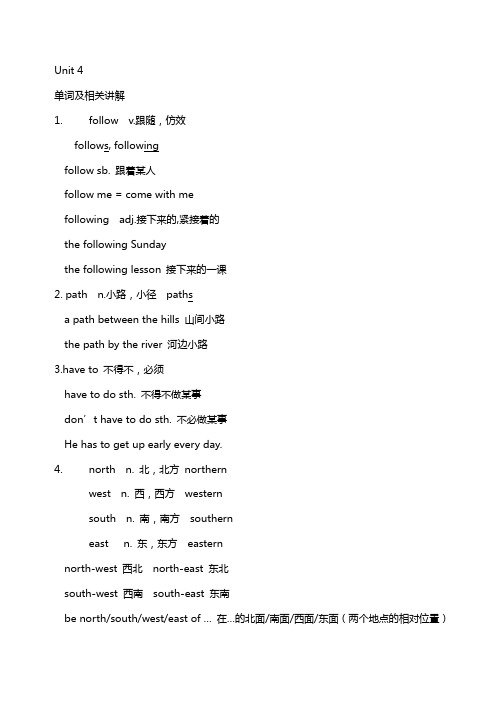
Unit 4单词及相关讲解1.follow v.跟随,仿效follows, followingfollow sb. 跟着某人follow me = come with mefollowing adj.接下来的,紧接着的the following Sundaythe following lesson 接下来的一课2. path n.小路,小径pathsa path between the hills 山间小路the path by the river 河边小路3.have to 不得不,必须have to do sth. 不得不做某事don’t have to do sth. 不必做某事He has to get up early every day.4.north n. 北,北方northernwest n. 西,西方westernsouth n. 南,南方southerneast n. 东,东方easternnorth-west 西北north-east 东北south-west 西南south-east 东南be north/south/west/east of …在…的北面/南面/西面/东面(两个地点的相对位置)The zoo is north of our school. 动物园在我们学校的北面。
区别be in the north/south/west/east of …在…的北部/南部/西部/东部(一个地点在另一个地点内部的位置)Beijing is in the north of China. 北京在中国的北部。
另外:be to the north of …类似be north of …,指在…以北,一般相邻Russia is to the north of China.例子:无锡东邻上海。
Wuxi is west of Shanghai.上海东临大海。
Shanghai is west of the sea.台湾在中国南部。
七下四单元英语笔记

七下四单元英语笔记
以下是一些关于人教版七年级下册英语第四单元的笔记,希望对你有所帮助:
- 重点短语
- on time 准时
- listen to music 听音乐
- in class 在课上
- be late for 做某事迟到
- fight with sb. 和某人打架
- 重点语法
- Don't + 动词原形构成否定祈使句。
- 情态动词have to 的用法:意思是"必须、不得不",它侧重于客观上
的必要和外界的权威。
- 情态动词can 的用法:表示能力," 会" " 能";表示允许、许可," 可以" 、" 能"。
- 重点句子
- What are the rules? 规则是什么?
- Don't run in the hallways. 不要在走廊上跑。
- Can we eat in the classroom? No, we can't. 我们可以在教室里吃东西
吗?不,我们不可以。
人教版英语七年级下册unit2笔记

人教版英语七年级下册unit2笔记全文共3篇示例,供读者参考篇1Unit 2 - My DayIntroduction: In Unit 2 of the People's Education Press English textbook for seventh grade, students will learn how to talk about their daily routines and schedules. This unit will help students to describe their daily activities and understand the use of time expressions in English. By the end of this unit, students will be able to discuss their daily routines with others and ask about the daily routines of others.Vocabulary:1. get up2. have breakfast3. brush teeth4. go to school5. have lunch6. do homework7. play sports8. watch TV9. go to bedGrammar:1. Present Simple Tense: Students will learn how to use the present simple tense to talk about their daily routines. For example, "I get up at 7 o'clock every morning."2. Time Expressions: Students will also learn how to use time expressions to indicate the time of day an activity takes place. For example, "I have breakfast at 7:30 in the morning."3. Adverbs of Frequency: Students will learn how to use adverbs of frequency to talk about how often they do certain activities. For example, "I always brush my teeth before bed."Activities:1. Role-Playing: Students will engage in role-playing activities to practice talking about their daily routines with their classmates. This will help them to improve their speaking and listening skills.2. Vocabulary Games: Students will play games to practice the vocabulary words related to daily routines. This will help them to memorize and use the new vocabulary in context.3. Writing Tasks: Students will complete writing tasks to describe their daily routines in detail. This will help them to practice using time expressions and adverbs of frequency in sentences.Conclusion: Unit 2 of the People's Education Press English textbook for seventh grade is an important unit that will help students to talk about their daily routines and schedules in English. By practicing vocabulary, grammar, and speaking activities related to daily routines, students will improve their English language skills and be able to communicate more effectively in everyday situations.篇2Unit 2 Pen PalsIn this unit, students will learn how to write pen pal letters and understand different cultures and customs through exchanging letters with pen pals from other countries.Key Vocabulary:1. Pen pal: A person with whom one exchanges letters on a regular basis, usually from a different country or background.2. Culture: The beliefs, customs, arts, etc., of a particular society, group, place, or time.3. Customs: A traditional and widely accepted way of behaving or doing something that is specific to a particular society, place, or time.4. Traditional: Of or relating to the beliefs, customs, practices, etc., of a culture or society that have existed for a long time.5. Exchange: The act of giving or taking one thing in return for another.Grammar Focus:1. Simple Present Tense: Used to talk about habits, routines, and facts.- I like to play basketball.- She goes to school every day.- Dogs bark.- The Earth revolves around the Sun.2. Wh- Questions: Used to ask for information.- What is your favorite color?- Where do you live?- When is your birthday?- Why do you like playing soccer?3. Adverbs of Frequency: Used to show how often an action is done.- I always brush my teeth before bed.- He rarely eats fast food.- They often go to the movies on weekends.- She never wakes up late.Cultural Insights:Through writing letters to pen pals from different countries, students will learn about the customs, traditions, and daily life of people from other cultures. They will gain a deeper understanding of diversity and develop empathy andopen-mindedness towards people with different backgrounds.Activities:1. Writing Pen Pal Letters: Students will practice writing letters to pen pals from different countries, introducingthemselves, sharing their hobbies and interests, and asking questions about their pen pals' lives.2. Cultural Exchange Presentations: Students will research a specific country and create presentations to share with their classmates, highlighting the country's customs, traditions, food, and important cultural aspects.3. Role-Playing: Students will engage in role-playing activities where they take on the persona of their pen pals and interact with each other, practicing written and spoken English skills.Overall, Unit 2 provides students with an opportunity to broaden their horizons, learn about different cultures, and improve their English language skills through engaging activities and interactions with pen pals from around the world.篇3Unit 2 My DayPart 1: Background InformationIn Unit 2, students will learn about daily routines and time expressions. They will be able to talk about their own daily activities using present simple tense and adverbs of frequency.They will also learn how to ask and answer questions about daily routines.Part 2: Vocabulary1. daily routines: things that someone does regularly every day2. wake up: to stop sleeping and become conscious3. get up: to leave your bed4. brush teeth: to clean your teeth using a toothbrush5. have breakfast: to eat a morning meal6. go to school: to travel to a place where one learns7. have lunch: to eat a midday meal8. go home: to travel back to one's place of residence9. have dinner: to eat an evening meal10. go to bed: to lie down in order to sleepPart 3: Grammar- Present simple tense: Students will learn how to use the present simple tense to talk about their daily routines. They willalso learn about the third person singular form (he/she/it) with the –s ending.- Adverbs of frequency: Students will learn how to use adverbs of frequency (always, usually, often, sometimes, rarely, never) to talk about how often they do things.Examples:- I always brush my teeth before going to bed.- She usually goes to bed early.- He often has breakfast at 7:00 am.Part 4: Speaking and Listening- Students will practice asking and answering questions about their daily routines with their classmates.- They will also listen to dialogues about daily activities and answer questions based on the information provided.Part 5: Reading and Writing- Students will read short passages about different people's daily routines and answer comprehension questions.- They will also write about their own daily routines using the present simple tense and adverbs of frequency.Overall, Unit 2 will help students improve their listening, speaking, reading, and writing skills in English while learning about daily routines and time expressions. By the end of the unit, students should be able to talk about their own daily activities confidently and accurately.。
7BU4知识点
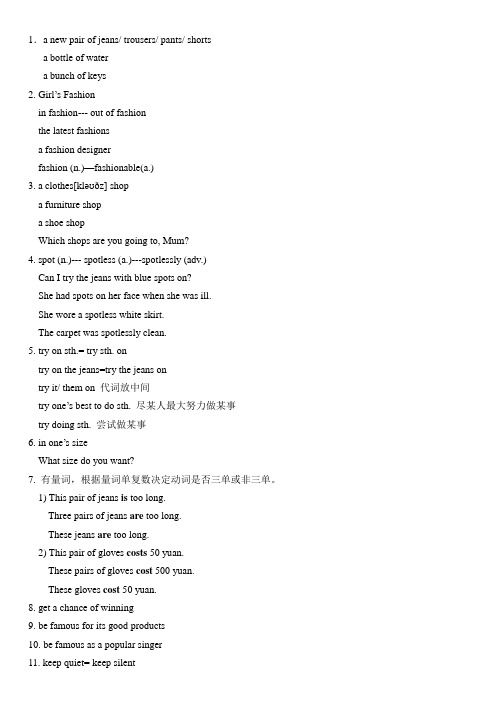
1.a new pair of jeans/ trousers/ pants/ shortsa bottle of watera bunch of keys2. Girl’s Fashionin fashion--- out of fashionthe latest fashionsa fashion designerfashion (n.)—fashionable(a.)3. a clothes[kləʊðz] shopa furniture shopa shoe shopWhich shops are you going to, Mum?4. spot (n.)--- spotless (a.)---spotlessly (adv.)Can I try the jeans with blue spots on?She had spots on her face when she was ill.She wore a spotless white skirt.The carpet was spotlessly clean.5. try on sth.= try sth. ontry on the jeans=try the jeans ontry it/ them on 代词放中间try one’s best to do sth. 尽某人最大努力做某事try doing sth. 尝试做某事6. in one’s sizeWhat size do you want?7. 有量词,根据量词单复数决定动词是否三单或非三单。
1) This pair of jeans is too long.Three pairs of jeans are too long.These jeans are too long.2) This pair of gloves costs 50 yuan.These pairs of gloves cost 500 yuan.These gloves cost 50 yuan.8. get a chance of winning9. be famous for its good products10. be famous as a popular singer11. keep quiet= keep silent12. turn around13. 一般将来时的其他用法be about to+动词原形The final exam is about to begin.be to+动词原形The meeting is to take place tomorrow.14. A policeman came towards him and helped him up.15. He walked towards the street corner and saw a street cleaner emptying the rubbish bins.16. knock sb. downA car came towards the old lady and knocked her down.17. catch fireMany houses caught fire and burned down in the forest.18. both… and…Both my neighbour and I are architects.He helped both the policeman and the ambulance man in the road accident.19. motor(n.)---motorcycle(n.)---motorcyclist(n.)The motorcyclist fell off his motorcycle.20. hurt--- hurt---- hurtLuckily, no one was hurt in the accident.My eyes were hurt in the fire.21. certain (a.) certainly (adv.)= surely=of course22. break---broke---brokenThe boy has a broken leg and is in hospital now.23. anythingDo you have anything to say?Has anything interesting happened?We can’t believe anything he says.24. myselfI am teaching myself French.我在自修法语。
最全面人教版七年级下册英语第四单元知识点归纳总结
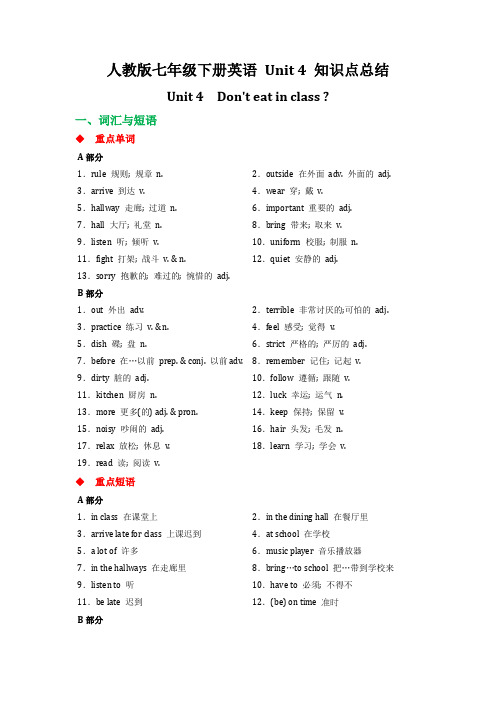
人教版七年级下册英语Unit 4 知识点总结Unit 4 Don't eat in class ?一、词汇与短语◆重点单词A部分1.rule 规则; 规章n.2.outside 在外面adv. 外面的adj. 3.arrive 到达v.4.wear 穿; 戴v.5.hallway 走廊; 过道n.6.important 重要的adj.7.hall 大厅; 礼堂n.8.bring 带来; 取来v.9.listen 听; 倾听v.10.uniform 校服; 制服n. 11.fight 打架; 战斗v. & n.12.quiet 安静的adj.13.sorry 抱歉的; 难过的; 惋惜的adj.B部分1.out 外出adv.2.terrible 非常讨厌的;可怕的adj. 3.practice 练习v. & n.4.feel 感受; 觉得v.5.dish 碟; 盘n.6.strict 严格的; 严厉的adj. 7.before 在…以前prep. & conj. 以前adv.8.remember 记住; 记起v. 9.dirty 脏的adj.10.follow 遵循; 跟随v. 11.kitchen 厨房n.12.luck 幸运; 运气n.13.more 更多(的) adj. & pron.14.keep 保持; 保留v. 15.noisy 吵闹的adj.16.hair 头发; 毛发n.17.relax 放松; 休息v.18.learn 学习; 学会v.19.read 读; 阅读v.◆重点短语A部分1.in class 在课堂上2.in the dining hall 在餐厅里3.arrive late for class 上课迟到4.at school 在学校5.a lot of 许多6.music player 音乐播放器7.in the hallways 在走廊里8.bring…to school 把…带到学校来9.listen to 听10.have to 必须; 不得不11.be late 迟到12.(be) on time 准时B部分1.too many 太多的2.go out 外出(娱乐)3.on school nights 在上学期间的晚上4.practice the guitar 练习吉他5.do the dishes. 清洗餐具6.make breakfast 做早饭7.make one's bed 铺床8.read a book 看书9.think about 考虑10.be strict (with sb.) (对某人)要求严格11.follow the rules 遵守规则12.good luck 祝好运◆重点句子A部分1.Don't arrive late for class. You must be on time. 不准上课迟到,务必守时。
七年级下册英语4单元笔记
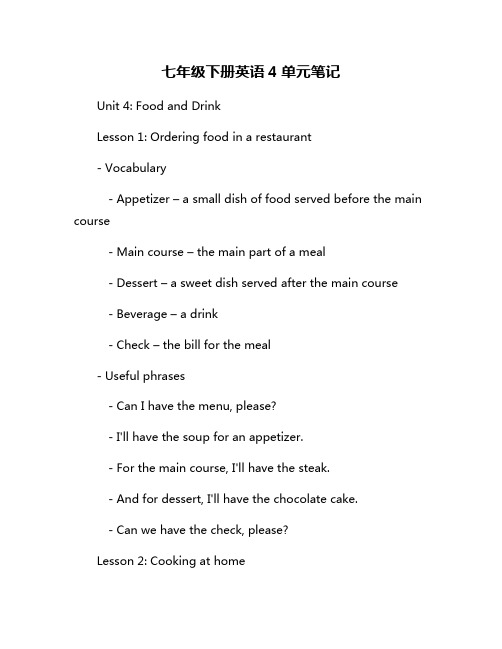
七年级下册英语4单元笔记Unit 4: Food and DrinkLesson 1: Ordering food in a restaurant- Vocabulary- Appetizer – a small dish of food served before the main course- Main course – the main part of a meal- Dessert – a sweet dish served after the main course- Beverage – a drink- Check – the bill for the meal- Useful phrases- Can I have the menu, please?- I'll have the soup for an appetizer.- For the main course, I'll have the steak.- And for dessert, I'll have the chocolate cake.- Can we have the check, please?Lesson 2: Cooking at home- Vocabulary- Recipe – a set of instructions for preparing a dish- Ingredients – the foods and seasonings needed to prepare a dish- Utensils – tools used in the kitchen- Boil – to heat a liquid until bubbles rise to the surface- Fry – to cook food in hot oil or butter- Useful phrases- I found a great recipe for chicken noodle soup.- What ingredients do we need for spaghetti?- Can you pass me the spatula?- We need to boil the pasta for 10 minutes.- Don't forget to fry the chicken for the stir-fry.Lesson 3: Healthy eating- Vocabulary- Nutrients – substances in food that help the body grow and stay healthy- Carbohydrates – a source of energy found in foods like bread, pasta, and rice- Protein – a nutrient found in foods like meat, fish, and beans that helps build and repair body tissues- Vitamins – nutrients found in fruits and vegetables that help the body function properly- Minerals – nutrients like calcium and iron that help the body grow and stay healthy- Useful phrases- It's important to eat foods that are rich in nutrients.- Carbohydrates give us energy to do our daily activities.- Protein is essential for building strong muscles.- Vitamins and minerals are found in fruits and vegetables.- Eating a balanced diet is key to staying healthy.Lesson 4: Food customs around the world- Vocabulary- Cuisine – a style of cooking- Ritual – a set of actions performed during a religious ceremony- Etiquette – proper behavior in social situations- Tradition – a belief or behavior that is passed down through generations- Symbol – something that represents something else- Useful phrases- Chinese cuisine is known for its use of fresh ingredients and bold flavors.- In Japan, it is customary to slurp noodles loudly to show appreciation for the meal.- Table manners are an important part of Western etiquette.- Many cultures have food rituals associated with holidays and special occasions.- Food can be a symbol of cultural identity and heritage.Overall, Unit 4 focuses on different aspects of food and drink, including ordering food in a restaurant, cooking at home, healthy eating, and food customs around the world. By learningthe vocabulary and useful phrases in this unit, students can improve their English skills and broaden their knowledge of food-related topics.。
北师大版七年级英语下册 Unit 4 笔记
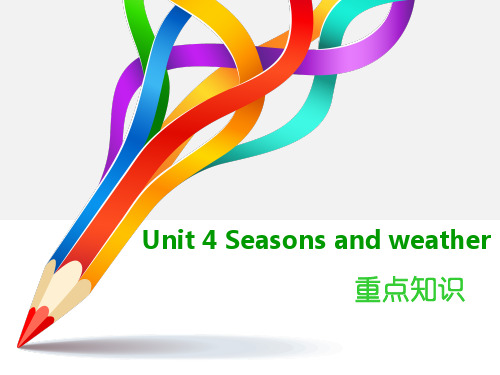
四、语法解析
2. be going to + V原 肯:主 + be going to + V原 He is going to clean my bedroom tonight. 否:主 + be + not + going to+ V原 I'm not going to throw it away.( throw away扔掉) 一般疑问:Be +主 + going to + V原 Are you going to visit your grandma this weekend? 特殊疑问:特殊疑问词+be +主 + going to + V原 What are you going to do tomorrow? (三)时间状语 tomorrow, the day after tomorrow, next week, from now on, in the future, soon(不久), in three years(三年 以后), one day/ someday(未来的某天)
三、知识梳理
Байду номын сангаас
7. leaf “树叶”,其复数形式为 leaves 8. make sure “确保,务必” ,其后跟 to do或 that从句。 9. be famous for因...而著名;be famous as作为...而出名。 10. make sb/ sth. do 使某人/ 某物...。 11. as...as 像...一样...。注意:两个as中间一定要用形容词 或副词的原形。 12. all over 遍及 13. weather “天气”,是不可数名词 14. enjoy doing 喜欢做某事;enjoy oneself 过得愉快 15. exciting 意为“令人兴奋的”,常用来修饰事物; excited 意为“兴奋的”,常用来修饰人。如:The exciting news made them excited. 16. 雨大,雪大用“heavy”, 风大用 “strong”
课堂笔记七下 Unit 4

【课堂笔记】七年级下册Unit 4一、重点短语arrive late for class上课迟到after breakfast早饭后after that 在那之后be quiet in the library在图书馆保持安静be strict with sb in sth 在某方面对某人严格bring music players to school把音乐播放器带到学校来do the dishes清洗餐具eat outside在外面吃feel/be terrible感到/是很糟糕的fight with sb 和某人打架follow the rules遵守规则go to bed before 10:00 10点之前睡觉have more rules有更多规则have to clean the classroom必须打扫教室have to wear a school uniform必须穿校服have too many rules有太多规章制度help his mom make breakfast帮他妈妈做早饭in the dining hall在餐厅in the music room在音乐室keep my hair short留短发know how you feel知道你的感受learn to play the piano学会弹钢琴make one's bed铺床make rules制定规章制度on school days 在上学日on school nights在上学晚上practice (playing) the guitar练习(弹)吉他read books/read a book读书run in the hallways在走廊上跑some of the rules其中一些规章制度二、重点句型1.—What are the rules at your school?在你们学校有什么规章制度?—We can't arrive late for class./We must be on time for class.我们上课不能迟到。
人教版七级下册英语Unit4知识点
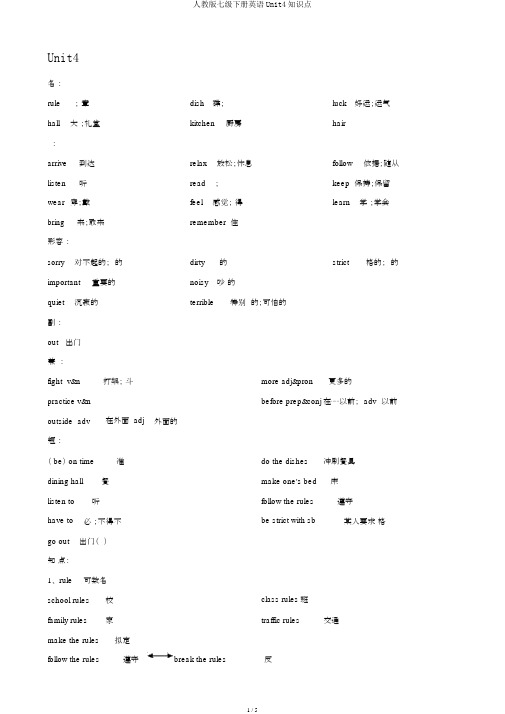
Unit4名:rule;章dish碟;luck好运;运气hall大;礼堂kitchen厨房hair:arrive到达relax放松;休息follow依据;随从listen听read;keep保持;保留wear穿;戴feel感觉;得learn学;学会bring来;取来remember 住形容:sorry对不起的;的dirty的strict格的;的important重要的noisy吵的quiet沉寂的terrible特别的;可怕的副:out出门兼:fight v&n打架;斗more adj&pron更多的practice v&n before prep&conj在⋯⋯以前;adv以前outside adv在外面 adj外面的短:( be) on time准do the dishes冲刷餐具dining hall餐make one's bed床listen to听follow the rules遵守have to必;不得不be strict with sb某人要求格go out出门()知点:1、 rule可数名school rules校class rules班family rules家traffic rules交通make the rules拟定follow the rules遵守break the rules反2、 arrive到达arrive at +小地方arrive in +大地方arrive home/here/there到家 /到 / 到那I usually arrive at the bus station at 6:30 every morning.我平时在每天清早六点半到达公交站。
When did you arrive in Shanghai你什么候到达的上海He arrives home late every day.他每天都很晚到家。
Tom每天清7 点到学校。
- 1、下载文档前请自行甄别文档内容的完整性,平台不提供额外的编辑、内容补充、找答案等附加服务。
- 2、"仅部分预览"的文档,不可在线预览部分如存在完整性等问题,可反馈申请退款(可完整预览的文档不适用该条件!)。
- 3、如文档侵犯您的权益,请联系客服反馈,我们会尽快为您处理(人工客服工作时间:9:00-18:30)。
Unit 4 Let's go shoppingPhrases1. a toy shop2. a clothes shop3. a shoe shop4. a furniture shop5. a bookshop6. a supermarket7. Toys for Kids8. Girls' Fashion9. Super Shoes10. China Carpets11. many different shops12. a new pair of jeans13. let me buy you a shirt14. need to buy a computer book for your dad15. need to buy a pair of shoes for myself16. buy some food for dinner tonight17. the jeans with the blue belt or the ones with the yellow belt18. the shirt with the long sleeves or the one withthe short sleeves19. a dress with the blue spots20. a sweater with the V-neck/ the round neck21. a pair of trousers with the checks22. trousers with the stripes23. try on clothes = try clothes on = try them on24. too long and loose25. too short and tight26. in my size27. XS/ S / M/ L/ XLextra small/ small/ medium/ large/ extra largeEnglish meaning:1. carpet --- a thick, heavy floor covering, usually made of wool2. certainly --- of course3. check --- a single one of the squares4. kid --- a child or young person5. medium --- of middle size6. neck --- the part of the body that connects the head with theshoulder7. spot --- a small part unlike the rest8. super --- wonderful9. tight --- fitting closely, close10. try on --- put on to test the size or looks11. tight ←→loose adj.Transformation1. I --- me --- my --- mine --- myself pron.2. clothes n. --- cloth n. --- clothing n.3. fashion n. --- fashionable adj.4. taste v. --- tasty adj.5. fun n. --- funny adj.6. kid n. --- kid(ding) v.7. spot n. --- spotted adj. --- spotless adj.8. certain adj. --- certainly adv.9. change v. / n. --- changeable adj.10. bake n. --- baker n. --- bakery n.Grammar1. need to do/ needs to do/ needed to do/ will need to doe.g. We need to buy something for dinner.Alice also needs to buy a new shirt for the performance.t here.'Tom needed your help yesterday, but you weren The students will need another plan for the coming weekend.2. something / anything/ nothing + 形容词e.g. I have something important to tell you. Have you got anything else to eat?Peter has nothing emergent to do now.3. buy sb. sth. = buy sth. for sb.draw sb. sth. = draw sth. for sb.make sb. sth. = make sth. for sb.cook sb. sth. = cook sth. for sb.搭配介词to 的词组:give sb. sth. = give sth. to sb.bring sb. sth. = bring sth. to sb.send sb. sth. = send sth. to sb.pass sb. sth. = pass sth. to sb.show sb. sth. = show sth. to sb.write sb. sth. = write sth. to sb.leave sb. sth. = leave sth. to sb.tell sb. (about) sth. = tell sth. to sb.4. a pair of trousers/ pants/ jeans/ socks/ shoes/ boots/ glasses; etc.e.g. A pair of jeans is enough when you go traveling.There are three pairs of trousers over there. You can try them on.The jeans over there are only for men.5. … with … (pattern)e.g. … with the spots; with the long/short sleeves; with the checks;with the stripes; with the V-neck; with the round neck; with ahood; with a zipper; with the buttons;6. the one/ the onese.g. Would you like the blue shirt or the grey one? Do you prefer the Nike shoes or the Adidas ones?7. for oneself; by oneself; help oneself; introduce oneself; e.g. I want to buy a pair of shoes for myself.I usually go to school by myself. Can you do it yourself?Help yourselves to the food, everyone. Let me introduce myself first.8. wear/ put on/ dress/ have…one.g. I usually wear casual clothes.Put on your coat, Tom. It's cold outside today. Tom can dress himself now. He is dressed in a uniform today. The policemen always have their uniforms on.9. Different types of shopsa toy shop; a clothes shop; a shoe shop; a furniture shop; a bookshop;a supermarket; a pet shop; a bakery; a fruit shop;a grocery shop(grocer's); a flower shop; a stationery shop; a gift shop; aduty-free shop; a discount shop(折扣店); outlets;a department store; a shopping centre(mall); achain store(连锁店); a flagshipstore; a market; a free market; a flea market(跳蚤市场); a corner shop; a news stand(书报亭); a convenience shop; an optical shop(眼镜店); a video shop; a drug store(pharmacy); a beauty salon, tailor's,barber's, hair dresser's, a beauty salon, etc.10. Different kinds of clothesshirt; T-shirt; blouse; sweater; dress; skirt; trousers/pants; jeans; shorts; coat; waistcoat; jacket; suit; pajamas(sleeping suit);swimming suit(bikini); tuxedo; underwear; etc.。
